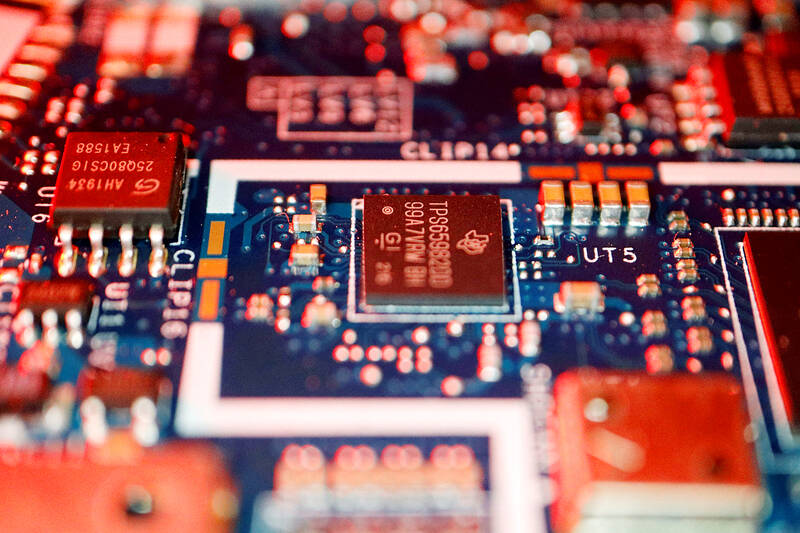The US’ imposition of controls on chip exports to China might throttle Beijing’s plan to obtain breakthrough technologies in chip manufacturing, a study by the Taiwan Industry Economic Services said.
US President Joe Biden in August signed the Creating Helpful Incentives to Produce Semiconductors (CHIPS) and Science Act, which authorizes US$52.7 billion of subsidies for US chipmakers while banning the export of chips more advanced than 28 nanometers to China for 10 years.
It also imposes export controls on technologies linked to diamond and gallium oxide semiconductors, as well as software used in the design of complex circuits and gas turbines.

Photo: REUTERS
South Korea’s Samsung Electronics Co has been hit the hardest by the restrictions, as it has been trying to secure a foothold in the US while having a significant presence in China, the research institute wrote in a study commissioned by the Mainland Affairs Council.
Samsung Electronics has since 2012 invested US$25.8 billion in China, including on manufacturing facilities in Xian which account for 42.5 percent of its NAND flash memorychip manufacturing capacity, the institute said.
Should the US ban prevent Samsung from upgrading its Xian factory, the company’s competitiveness in the memorychip market would suffer a significant setback, it said.
This development would spell trouble for China’s plans to build semiconductor supply chains and limit the potential capacity of the country’s tech industry, it added.
Washington’s efforts to target the Chinese high-tech sector have intensified with the CHIPS Act, which suggests that the trade dispute between the two countries is not likely to abate son, the institute said.
The US-led blockade and regime of surveillance on technologies would profoundly impact the chipmaking sector in China, due to the industry’s dependency on imported products and technologies, it said.
Last year, China’s semiconductor imports surged 23.6 percent to a record US$432.6 billion, indicating that a local chip shortage had reached crisis proportions, the institute said, adding that the problem appears to be worsening.
Despite recent advances in the 7 nanometer process and NAND flash memory manufacturing, China would likely struggle in dealing with the ban due to the US’ control over lithography machines, electronic design automation and crucial chip technologies, it said.
This means continuing US action could snuff out China’s efforts to acquire advanced manufacturing processes and memory chips, it said.
China has also been grappling with a worsening shortage of electronics engineers. In 2020, 210,000 people graduated from electronics engineering departments or related fields, accounting for 2.3 percent of all college graduates, the study said.
Only 13.77 percent, or about 28,000 people, of electronics graduates found work as electronics engineers, it said.
This means China has 250,000 fewer electronic engineers than it needs, further limiting the country’s means of building a national semiconductor industry, it said.
Protectionist regulations being adopted in the US and other countries increasingly prevent China from leveraging foreign acquisitions as a shortcut to foster a domestic technology sector, the study said.
Due to US pressure, companies in the EU, Japan, Singapore and South Korea are discouraged from engaging in technical cooperation with China or outsourcing to that country, a factor that further disadvantages the development of the Chinese semiconductor industry, it said.

DEFENSE: The National Security Bureau promised to expand communication and intelligence cooperation with global partners and enhance its strategic analytical skills China has not only increased military exercises and “gray zone” tactics against Taiwan this year, but also continues to recruit military personnel for espionage, the National Security Bureau (NSB) said yesterday in a report to the Legislative Yuan. The bureau submitted the report ahead of NSB Director-General Tsai Ming-yen’s (蔡明彥) appearance before the Foreign and National Defense Committee today. Last year, the Chinese People’s Liberation Army (PLA) conducted “Joint Sword-2024A and B” military exercises targeting Taiwan and carried out 40 combat readiness patrols, the bureau said. In addition, Chinese military aircraft entered Taiwan’s airspace 3,070 times last year, up about

The Overseas Community Affairs Council (OCAC) yesterday announced a fundraising campaign to support survivors of the magnitude 7.7 earthquake that struck Myanmar on March 28, with two prayer events scheduled in Taipei and Taichung later this week. “While initial rescue operations have concluded [in Myanmar], many survivors are now facing increasingly difficult living conditions,” OCAC Minister Hsu Chia-ching (徐佳青) told a news conference in Taipei. The fundraising campaign, which runs through May 31, is focused on supporting the reconstruction of damaged overseas compatriot schools, assisting students from Myanmar in Taiwan, and providing essential items, such as drinking water, food and medical supplies,

A magnitude 4.3 earthquake struck eastern Taiwan's Hualien County at 8:31am today, according to the Central Weather Administration (CWA). The epicenter of the temblor was located in Hualien County, about 70.3 kilometers south southwest of Hualien County Hall, at a depth of 23.2km, according to the administration. There were no immediate reports of damage resulting from the quake. The earthquake's intensity, which gauges the actual effect of a temblor, was highest in Taitung County, where it measured 3 on Taiwan's 7-tier intensity scale. The quake also measured an intensity of 2 in Hualien and Nantou counties, the CWA said.

New Party Deputy Secretary-General You Chih-pin (游智彬) this morning went to the National Immigration Agency (NIA) to “turn himself in” after being notified that he had failed to provide proof of having renounced his Chinese household registration. He was one of more than 10,000 naturalized Taiwanese citizens from China who were informed by the NIA that their Taiwanese citizenship might be revoked if they fail to provide the proof in three months, people familiar with the matter said. You said he has proof that he had renounced his Chinese household registration and demanded the NIA provide proof that he still had Chinese